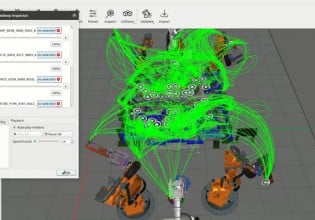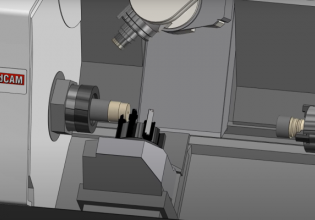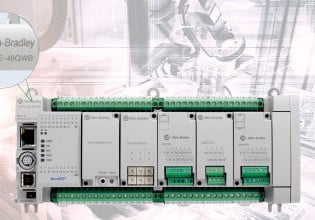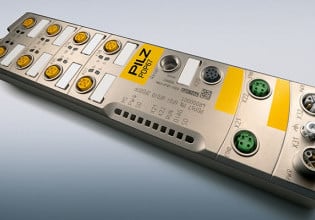Accelerate PLC Ladder Logic Learning with New Arduino Starter Kit
Tackling a growing need for education in industrial automation, Arduino has launched a starter kit for PLC learning based on the new Opta, the PLC IDE, and hardware to integrate I/O devices.
Anyone graduating from an electrical or control-related engineering educational program in the past decade has no doubt heard of (and most likely used) an Arduino board to learn the fundamentals of coding and component hardware. Up until recently, the crossover from Arduino programming classes to industrial automation has been a stretch, relying only on the basic fundamentals of Ohm’s Law and I/O signals, but then expanding that knowledge to the new world of PLC control.
More recently, exciting developments from the Arduino Pro lineup have culminated in the most recent launch of the PLC starter kit, cementing the brand as a platform for learning not only the basics of electronics theory but also the finer points of industrial I/O, communication, ladder logic programming, and troubleshooting.
Equipped with tools like these, students and emerging professional engineers can gain the knowledge to move forward into more advanced roles, while both companies and schools can invest in familiar, community-supported hardware to train a new generation of control system experts.
What is Included in the Arduino PLC Starter Kit?
To effectively learn how to manipulate and control PLCs, a few elements are required. Any standalone piece, be it the PLC, the programming IDE, or the I/O devices, are not enough to teach the full scope of control.

Arduino’s new PLC starter kit. Image used courtesy of Arduino
The starter kit includes the following items:
Arduino’s Opta WiFi PLC
This micro form factor PLC includes digital inputs and relay outputs, enough for a small project or communication with a larger I/O network. Control Automation has published tutorial articles for the Opta PLC in the past.
This PLC contains 8x inputs, with both digital and analog capabilities, and 4x isolated relay outputs. The PLC can also communicate with industrial protocols, including Ethernet and both Modbus RTU and Modbus TCP. WiFi and Bluetooth connectivity allow IoT project integration.
Input/Output Simulators
For some students or professionals, it can be pretty simple to find a few switches, relays, and indicator lights at hand to simulate functional I/O devices. However, the starter kit removes this need by providing a board with 8x switchable digital inputs to serve as a simulator. A similar output simulator board provides an array of indicators as well as an additional temperature sensor for working with analog signals.
PLC IDE Software
To effectively train future generations of control engineers, programming skills are an absolute necessity. However, in today’s world, structured text programming lives alongside the age-old ladder logic electrical structure. Both conventions must be thoroughly understood to both work with current technology and to develop systems of the future.
The PLC IDE from Arduino provides a workspace in all of the IEC 61131 languages, and the official Arduino IDE 2 provides a parallel interface for programming in C++, familiar to Arduino enthusiasts.
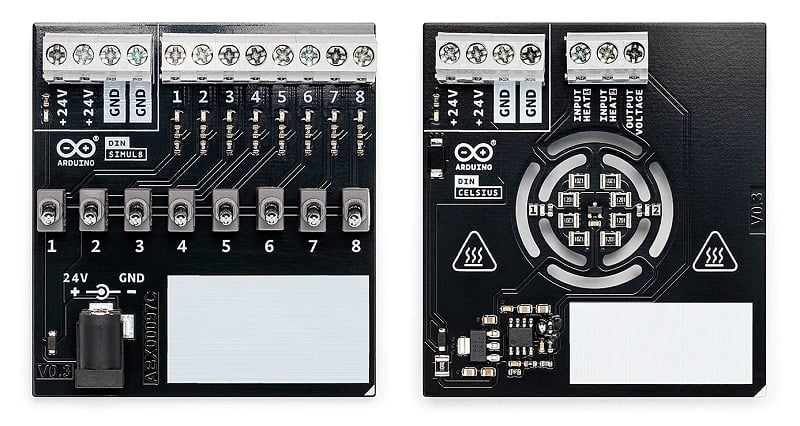
Input and output simulator boards. Image used courtesy of Arduino
Lessons and Curriculum
Before an educational kit can be branded as ‘complete,’ it must include resources for both student and teacher to progress from simple to advanced tasks. The 20 hours worth of curriculum advances from PLC history, to communications, to integration with external equipment.
Required Accessories
The kit also includes all the necessary elements to begin programming immediately: a power supply and cable to power the entire kit, a USB-C programming cable, and wires in typical colors for signal clarity. The software is available for free from the website with no license required.
Learn PLCs and Invest in the Future
I’m thrilled to learn about this offering, having been a past user and teacher of Arduino systems for many years, and more recently, a user of both the Portenta Machine Control and Opta industrial platforms.
Education for students and professionals can be a difficult (and costly) initiative for schools and companies, and it’s always welcome to hear about manufacturers enabling access to education to ensure that we can continue moving the world forward by providing critical skills through real-world, hands-on materials.

